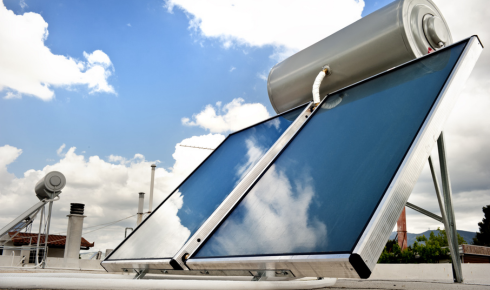In today’s world, the shift toward renewable energy is not just a trend but a necessity. With rising electricity costs and increasing environmental concerns, solar technology has become a powerful alternative to conventional energy sources. Among the different applications, a solar water heating system is one of the most practical and widely adopted solutions for both residential and commercial use. Similarly, large-scale Solar industrial projects are transforming the way factories and businesses meet their energy requirements.
Understanding Solar Water Heating Systems
A solar water heating system uses sunlight to heat water, reducing the need for electricity or gas-powered heating. The setup generally includes solar collectors, storage tanks, and a circulation system. Sunlight is captured by the solar collectors, which then transfer the heat to the water stored in the tank.
These systems are particularly beneficial in countries like India, where sunlight is abundant throughout the year. Whether in homes, apartments, hotels, hospitals, or schools, solar water heating is a cost-effective and eco-friendly option.
Key Benefits for Households and Businesses
- Energy Savings – By using solar power for heating water, households can cut electricity bills by up to 70%.
- Eco-Friendly – Reduces greenhouse gas emissions and dependency on fossil fuels.
- Low Maintenance – Once installed, these systems require minimal upkeep.
- Durability – High-quality systems can last 15–20 years with proper care.
In addition to homes, many commercial establishments such as hostels, spas, and restaurants benefit from consistent and cost-effective hot water through solar water heating systems.
Solar Energy in Industrial Applications
The use of solar technology is not limited to residential buildings. Industries are now embracing renewable energy for large-scale operations. Solar industrial applications include electricity generation, steam production, water heating, and even running heavy machinery.
Factories and production units consume massive amounts of energy. By adopting solar technology, they can not only reduce costs but also meet sustainability targets set by governments and international organizations. Solar-powered boilers, dryers, and process heating systems are becoming increasingly popular in food processing, textiles, chemicals, and pharmaceutical industries.
Why Industries Are Turning to Solar
- Cost Reduction – Energy-intensive industries benefit greatly from reduced fuel and electricity costs.
- Sustainability Goals – Many companies are aligning with global initiatives like net-zero emissions, making solar energy adoption a necessity.
- Government Incentives – Subsidies, tax benefits, and renewable energy policies encourage businesses to switch to solar.
- Brand Image – Consumers today prefer eco-conscious brands, and solar adoption enhances corporate reputation.
Integration of Water Heating and Industrial Solar
Interestingly, solar water heating is not just for residential use. Industries that require large volumes of hot water, such as dairies, breweries, and textile units, can integrate solar heating systems into their operations. This reduces dependency on grid electricity and fossil fuels while maintaining efficient production processes.
For example, a textile factory may use solar-heated water for dyeing fabrics, while a dairy could use it for pasteurization. These applications highlight the versatility of solar technology and its potential to revolutionize industrial energy use.
Factors to Consider Before Installation
Whether for households or industries, a few points must be evaluated before installation:
- Energy Requirement – Assess daily hot water or power needs.
- Available Space – Roofs or open land should have sufficient space and exposure to sunlight.
- System Quality – Ensure components are durable and backed by warranties.
- Service and Maintenance – Choose providers who offer after-sales support and annual maintenance.
The Future of Solar in India
India has set ambitious targets for renewable energy adoption, with solar energy at the core of these plans. From individual households to large industries, the potential for growth is immense. As solar technology becomes more affordable and advanced, water heating and industrial applications will continue to expand.
Conclusion
The adoption of solar technology represents a smart investment in both cost savings and environmental sustainability. From simple household water heating systems to large industrial setups, solar is reshaping how we generate and use energy. By embracing solar solutions today, households and businesses can secure a greener and more affordable tomorrow.



